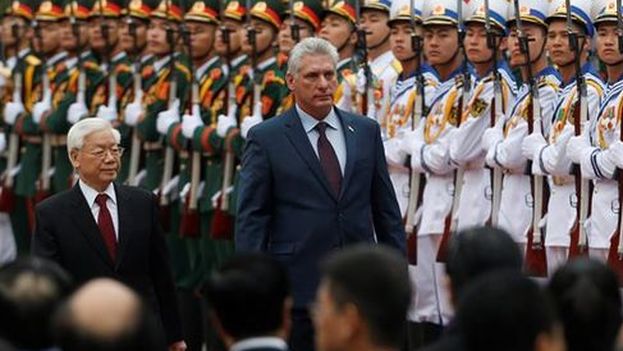
![]() 14ymedio, Yoani Sanchez, Lima, 13 November 2018 — If it were not for the two stopovers, one in Paris and the other in London, which Miguel Díaz-Canel made during his first official foreign tour at the head of the Cuban government, the map of his trip would be reduced to a group of countries that share ideological similarities and that are, for the Plaza of the Revolution, old allies from lost political battles.
14ymedio, Yoani Sanchez, Lima, 13 November 2018 — If it were not for the two stopovers, one in Paris and the other in London, which Miguel Díaz-Canel made during his first official foreign tour at the head of the Cuban government, the map of his trip would be reduced to a group of countries that share ideological similarities and that are, for the Plaza of the Revolution, old allies from lost political battles.
In “the world according to Diaz-Canel” there are only as few nations as fingers on a hand, Moscow is located a few kilometers from Havana, and both the Americas and Europe have disappeared from the map. It is a planet scuplted in the geology of authoritarianism and created at the will of all-powerful parties, a land where the fragile grass of democracy hardly grows.
During his journey through that reduced world, the 58-year-old engineer was officially received by leaders from five countries: Russia, China, North Korea, Vietnam and Laos. The trip generated abundant declarations of “total support and solidarity” between the rulers, several visits to mausoleums housing the remains of controversial leaders, and the signing of some trade and cooperation agreements.
This latter seems to be the core of so much hectic activity, because beyond the official rituals, the journey was marked by urgency and driven by the despair of a leader at the head of a bankrupt nation. It was a trip in search of patrons, a “pass of the hat,” to achieve an economic relief from the tense situation on the island.
The scope of the agreements reached in this tour and their impact on the economy will only be verified in the coming months, but according to the headlines in the official newspaper Granma, we can already read that the compañeros visited on the trip have not been very benevolent. There has been no lack of agreements or signatures for exchanges, but there have been few loans or donations after so many handshakes, beyond having obtained 60 investment projects and a loan of 50 million dollars to buy weapons.
With productivity in the toilet, foreign tourism that will fail to reach the 5 million promised visitors, and the default of investors lacking enthusiasm to buy a piece of the Cuban pie, Havana is experiencing an acute lack of liquidity that is deepening the daily problems. Nevertheless, despite this tense situation, Díaz-Canel did not opt to visit closer or more lucrative markets, in part because he is not looking for contracts, but rather alms.
In addition to help and donations, the trip aimed to reaffirm the concept of “continuity” that has become the cornerstone of Cuba’s rulers. To reassure those who, like Kim Jong-un, could fear that, with the help of a younger leader, Havana might undertake economic and political reforms that would allow it to strengthen ties with Washington, Brussels and other democratic governments.
To all of them the message was clear. Nothing moves in the politics of the Island without the consent of the Communist Party and the generational change is totally under control. With this mantra, late Castroism tries to renew the support provided by these five nations in international forums, following the crisis facing regional entities such as the Bolivarian Alliance for the Peoples of Our America (ALBA) and the Community of Latin American and Caribbean States (CELAC).
A third reason to undertake this “path of complicity” has been to annoy the United States and to make it clear to the European Union that it is not a priority on the Cuban agenda. And, in passing, slam the door on Latin American administrations that believed that without a Castro in power dialogue with the island would be easier. By preferring not to travel through the countries of the area, Cuba’s government has shown its low regional spirit and its disdain for its
Now, once this tour of necessity and ideological myopia is over, it remains only to wait for the real benefits it will have in everyday life. The millions of dollars agreed upon in exchanges are just a drop in an ocean of needs and are unlikely to deter those who plan to escape the island. Those thousands of Cubans who each year set a course for countries not included in the small world preferred by Miguel Diaz-Canel.
_________________
The 14ymedio team is committed to serious journalism that reflects the reality of deep Cuba. Thank you for joining us on this long road. We invite you to continue supporting us, but this time by becoming a member of 14ymedio. Together we can continue to transform journalism in Cuba.
